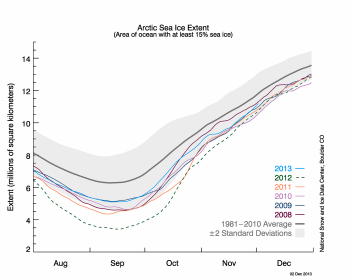First of all: merry Christmas, I hope you had a wonderful time with friends or family. Sadly, for most of us (in Europe at least) without snow this year.
Second of all, I'd like to apologize for the (selfish) focus on the snowsports industry in the last few posts, because of my own interest.
So finally, today a post about sea ice, one of the most obvious discussion points when talking about concern for the cold, very important and briefly touched upon in my Polar Bear Post.
In November, the arctic sea ice extent hit a severe low, although its overall extent was higher than over the previous years (National Snow and Ice Data Center). The figure below displays the sea ice dynamics of the past five years, showing how contrary to popular belief, ice has not been as directly impacted by climate change as people tend to think. Clear however is the trend that it's lower than the 1961-2010 average.
Arctic Sea Ice Extent (Source)
The reasons for this decrease in sea ice extent lie in the surface winds, causing the transpolar drift of sea ice. The increase in their force shortens the period of 'winter', when the ice gets time to thicken and add mass (Rigor and Wallace, 2004). The ice drifts out of the pacific sector, where it remains during 'summer' and advection takes place, thinning the sea ice. As all UCL'ers taking 'Past Climates' will also know, as it has been emphasized by Dr. Maslin, "Winter isn't isn't isn't important. It'll always be cold. It's the summer that does it, how long, how hot, that makes the difference."
Finally, besides the increased force of winds, the ice albedo feedback is the main influence on sea ice extent. If you remember the very first post, where we discussed this positive feedback mechanism. The thinner ice and larger areas of open water caused by the drifting increase the surface solar heating (Zhang et al., 2008).
The main concern connected to to ice extent is sea level rise, which would cause problems for many lower lying countries such as the Netherlands and parts of England. And of course, arctic ecosystem change and the acceleration of climate feedbacks are factors to consider.
If you'd like to know more, daily data and overall interesting information is posted every day on the National Snow and Ice Data Center website, which is very worth looking at and helps me contain myself not to bother you with 2000-word posts again. So here's the LINK.
Also, I wish you a happy new year and hope to see you on the blog again in 2014!
Cheers,
Larissa


Hi Larissa,
ReplyDeleteThanks for the interesting post! As I come from the tropical region where we do not see snow, I really enjoy reading your blog which provides interesting perspectives on snow sports and weather.
Many small island states in the tropics also face the same challenge of sea-level rise, and the melting ice is an area of major concern for us too.
The same quote from Dr Maslin sticks in my mind too! :) Looking forward to your next post.
Hi Larissa,
ReplyDeleteThanks for the interesting post! Loved the quote from Professor Maslin. He makes a great point, and I think it's often something that we don't hear when we think about climate change and ice, at least not in the media, etc.
Looking forward to the next post,
Katherine
Hi Larissa
ReplyDeleteEnjoyed the post! The sea ice extent is definitely a concern in terms of sea level and freshening of waters. I've been looking at an article for a certain other piece of coursework that explores the idea of reduced sea ice extent in summer forcing the jet stream southwards and leading to wetter summers/extremes in northern Europe and drier conditions in the Mediterranean. Really demonstrates the influence and feedbacks you mentioned. Here's the link if you are interested:)
http://www.independent.co.uk/news/uk/home-news/melting-arctic-sea-ice-meansits-only-going-to-get-wetter-for-northern-europe-8909587.html
Cheers...and Happy New Year
Thanks for the comments Joon, Katherine and Darren! Also, the article is very interesting Darren, thanks for the link.
ReplyDeleteSee you soon guys,
cheers